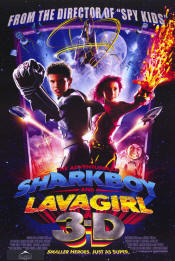Making movies. Enjoying movies. Remembering movies.
THE SCREENING ROOM
Related Articles:
|
By
Rick Mitchell

Robert Rodriguez and Steven
Soderbergh remain the two most interesting younger directors working
today. A true auteur, not surprising when you consider that like
Soderbergh and Spielberg and Carpenter before him, he began making films
performing all the key creative functions himself, Rodriguez has chosen
to work almost exclusively in genre, straddling the mainstream and
arthouse line, while using his interest in both film and comic books to
become probably the most visually stylistic director since William
Cameron Menzies.
It is really not that unusual for him to go from the controversial but
visual striking "Sin City" to the little kid friendly "The Adventures Of
Shark Boy And Lava Girl," drawn from stories made up by his six-year-old
son. What is interesting is that this film has all the fun and
excitement that was in the first two "Star Wars" films, but
disappointingly missing from the last four. And though its main
characters are ten-years-old, it's really
about as much a kiddie film as a Warner Bros. cartoon short or
traditional
Disney cartoon feature. Except for the "life lessons" messages spotted
throughout, the dialog is quite witty, and even those, as well as other
scenes, are
tempered by visual comedic asides, looks, and bits of business, some of
which are likely to go past a kid, but an older audience, should they
condescend to see it, would appreciate. (Tragically, apparently older
audiences aren't this time.)
"Shark Boy And Lava Girl" succeeds in making the fantasy real the way
Robert Zemeckis failed in "The Polar Express" because you do have real
people
interacting in these "unreal" settings. And though Rodriguez is
apparently as
pixelated as George Lucas, both know how to shoot for presentation on
the BIG
theater screen. Thus, even the non-CGI scenes look good. And Rodriguez
is
smart enough to recognize the effectiveness of fight scenes shot full so
that
you can tell what's going on, as well as appreciate the stuntpersons'
moves.
As for the anaglyph 3-D, I agree with Ray Zone (author, "3-D Filmmakers:
Conversations With Creators Of Stereoscopic Motion Pictures") that it's
probably the
best use of that much maligned but more commercially viable process to
date,
the only problem being the light loss from the glasses. All of the
compositions in depth worked and I didn't even have my usual problems
with objects"comin' at me" that I usually have, even with Polaroid, due to problems
with my eyes (for those who don't know, Raoul Walsh has his eye patch
back).
And though there are plenty of those kinds of shots, they are not as
obnoxiously annoying as in earlier 3-D films, plus Rodriguez is able to
use his
contemporary technology for the kind of compositions and moves that
would be the envy of 3-D filmmakers of the past, especially those who
had to use
the cumbersome equipment of the Fifties. I'm insufficiently conversant
with the technology to understand what he did about the color, but I
didn't find
it bothersome, and at the beginning there are some 3-D shots in the
"real"world which also did not look that far off. It's certainly better than
the dull, boring blue-gray look that far too many films are being DIed
to
these days. (It just hit me that there may be a pun in that; if so, it's
Freudianly intentional.)
Whatever the ultimate theatrical success of "Shark Boy...," future home
video success being assured, Rodriguez will probably do an older skewing
3-D
film, if he isn't already. That will determine the future viability of
3-D, especially if it is used creatively, as Rodriguez does, and not
annoyingly, as in the past. James Cameron has been planning several 3-D
films for
years, as he so announced at the Academy of Science-Fiction, Fantasy,
and Horror Films' Saturn Awards last year. Soderbergh, Joe Dante, and
even
Zemeckis would probably use it in a way that would extend its
popularity. Unfortunately Michael Bay, Rob Cohen, and/or Renny Harlin
may also
decide to do 3-D films and "Robot Monster" will end up looking like the
greatest
3-D film ever made!
Rick Mitchell is a film editor, film director, and film historian. He lives in Los Angeles.
© 2005 Rick Mitchell. All rights reserved
IMAGE © Dimension Films. All rights reserved
